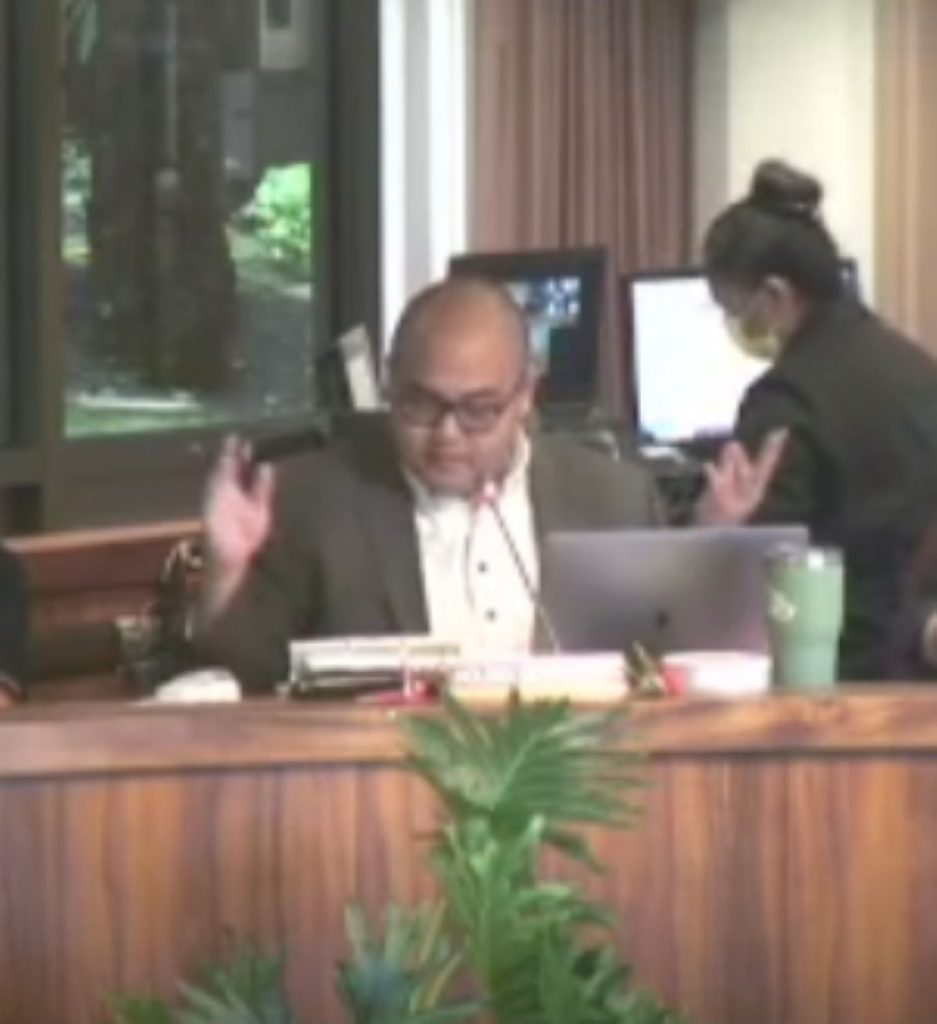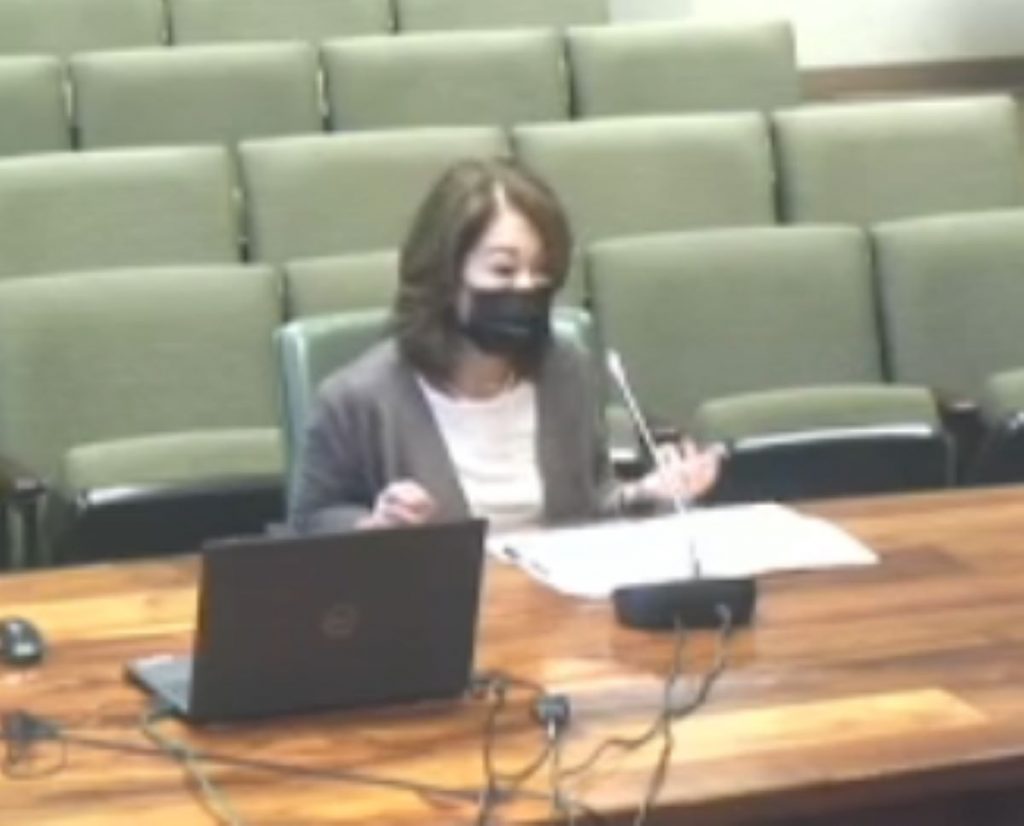Council Overrides Roth Veto of County Housing Program Revolving Fund Bill


The County Council on Wednesday, July 6, overrode Mayor Mitch Roth’s veto of a measure approved earlier this year that changed language surrounding the uses of the county’s housing program revolving fund.
Council members reconsidered Bill 152 during their regular meeting Wednesday. The measure, which repealed existing provisions and established nine specific uses for the housing program revolving fund, was vetoed by Roth in June because of concerns the new language would limit how the fund can be used by the county’s Office of Housing and Community Development.
Roth also asked the council to wait to reconsider the bill until a consultant’s report on the county’s code dealing with housing is completed.
The council voted 6-2 in favor of Bill 152 on Wednesday, with members Tim Richards and Ashley Kierkiewicz voting no and Matt Kaneali‘i-Kleinfelder absent, giving it the two-thirds majority needed to override Roth’s veto. The bill now becomes county ordinance.

The main sticking point for Roth was that the new language limits how the fund can be used. Office of Housing and Community Development Administrator Susan Kunz, Richards and Kierkiewicz each reiterated concerns Wednesday about restricting the fund and any unintended consequences that could have because the new language might not allow for uses other than those nine set forth.
The original code language was less specific: the fund could be used to pay for housing development and exercising a buyback option in favor of the county contained in any conveyance document and pay the costs of maintaining, repairing, renting or reselling units purchased by the county.
“I really don’t feel it’s the number of eligible items that makes it more broad, it’s the content of those eligible items,” Kunz told the council Wednesday. “So when we say the existing language talks about the revolving fund can be utilized for housing development, in my opinion, that is the broadest language that you could provide me to do this work. Having a closed list of eligible activities is not expanding use. It’s providing a total of nine eligible uses, but it’s still limiting in my opinion.”
She said she can’t possibly think of all potential activities the new language could curtail, but she wants to limit any of those unintended consequences.
“If we agree, and we do, I think we do, on the goal of trying to achieve the most amount of housing units for this community, then we need to broaden our ability to partner and to consider all options for housing production,” Kunz said.
The council members who originally introduced the measure and also asked for the council’s reconsideration and potential veto override, Holeka Inaba and Heather Kimball, argued the opposite. They say the original language of the bill limited the uses of the revolving fund.
Kimball said Bill 152 was certainly intended to expand the uses of the fund. She said the previous language listed just two uses for the fund. The new language, however, includes those two provisions as the first two of the new list of nine that the housing agency can use the fund.
“So we’ve added seven additional items to those two that were in the previous language,” Kimball said. “So in my mind, we have increased the usage.”
And they weren’t just pulled out of thin air.
“Holeka and I just didn’t sit around with a beer and say, ‘What can we add? Let’s do something fun,'” Kimball said. “We actually spent a lot of time researching and evaluating various housing plans. Maui housing plan was a big contributor to this, but also other municipalities, we looked at their housing plans. What are the things that get people into homes, keep people into homes, make affordable housing possible? It’s infrastructure, it’s those upfront costs, it’s things like that.”
To further support the need for Bill 152, Inaba said there is about $945,000 sitting in the housing preservation line item in the revolving fund.
Kunz explained that the line item was an older program meant to provide resources for rehabilitation of eligible households. It is no longer in play, so her office has been using the funds for the county’s residential repair program, a low-interest loan program for households for renovations. Inaba asked Kunz if the program is used by occupants of existing housing units who meet certain income guidelines to repair their homes. She said that is correct.
“So what I’m trying to get at here to my colleagues is that we support these types of programs. Unfortunately, the code currently reads the development of housing,” Inaba said, adding that while that language does potentially bring more people off the streets, Bill 152 also keeps people in their homes.
He said it’s questionable right now, with the previous language of the housing revolving fund code, whether some programs such as the residential repair program would be an allowable use of the fund. Bill 152 broadens the uses so the revolving fund can be used for those types of programs and others.
“We want to help our community and we want to continue programs like the program, so this is why we need to pass Bill 152,” Inaba said.
He said the council should pass the measure if it wants to support people staying in their houses through rehabilitation of those houses and units.
“Because if we don’t support this, we’re not supporting people who are going be homeless because they can’t afford their mortgage or their rent. We’re going to see people perhaps on the street because their house might go or be condemned because its unsafe, and that’s what the programs like residential repair program are for, and that’s what Bill 152 explicitly allows and which is currently, I would say, not allowed in the code,” Inaba told his fellow council members. “And I can’t express that anymore clearly to this council. We need to support these types of programs that the Office of Housing and Community Development is currently doing. Whether it’s allowed right now or not is questionable, so we should be allowing it and we should be passing this bill.”
Councilwoman Rebecca Villegas appreciated Inaba’s example and said it highlights the conundrum of whether some programs and uses are covered by the revolving fund’s original language.
“I appreciate the broadening the spectrum and identifying other opportunities and ways that we can support the vision and the goal of not only providing housing but ensuring those who are currently housed stay in that housing, and I feel confident that the changes that you’ve made to this and have brought forward are moving us in the right direction,” Villegas said.
Kimball and Inaba also pointed out that the code can be changed in the future to broaden the revolving fund’s uses even further if any unexpected consequences happen. That also gives future councils the opportunity to vet the ordinance when needed.
Kunz told council members that discussion has been had about being able to amend the code when unexpected situations happen, but raised concerns about timing. She said when it comes to housing development, time is of the essence and having to amend the code before being able to give a developer funds might become an issue.
She also hoped the council would consider holding off reconsideration of Bill 152 until the consultant’s review of Chapter 11 of the county charter was finished, calling the measure premature.
Council Chairwoman Maile David understands there the two camps of thought are coming from and wanted to make sure if it becomes apparent further amendment to the housing revolving fund code is necessary in the event situations such as those Kunz is concerned about arise that it is possible for council members and Kunz to work together to do so.
“Yeah, absolutely,” Kimball said. “I mean, that is the conversation we had.”
“I just wanted to make sure that that was what I’m hearing and actually give Ms. Kunz some sort of assurances that this is not the last and all,” David said. “It’s up to you folks to work it out so that everybody’s concerns are addressed.”
Kimball said that by implementing the new language in the revolving fund code, the council is saying clearly that it wants a broad set of uses of the fund, including the original uses, and the ability for the council to add to the list later and have that discussion is invaluable.
“I think it’s wonderful that we’re in a position where we are discussing mechanisms to provide affordable housing not whether or not we should do it,” she said. “I think that we all share a desire to address this problem to make sure that the people that are critical to our communities have a place to live and a place to call home.”
Roth issued a statement later Wednesday afternoon on the council’s decision to override his veto.
“We are extremely disappointed in the council for their blatant disregard for our administration’s discretion, particularly our housing administrator,” Roth said in the statement, which was provided to Big Island Now via email. “It’s clear that they were trying to expand the uses allowed of the county housing program revolving fund, but instead, what they’ve actually done is limit it. I stand by the discretion of Administrator Kunz and will work with her to ensure that she can perform the duties of her job without one hand tied behind her back. It is my hope that in the future, the council will defer to subject matter experts before making decisions over how they’re able to perform the duties of their job.”
Sponsored Content
Comments





_1770333123096.webp)


